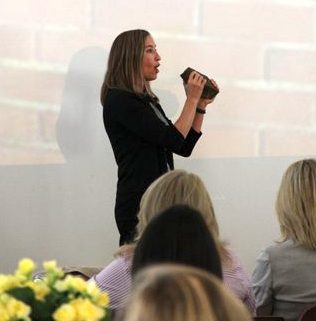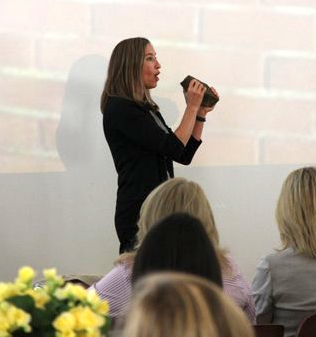
Michelle Kriebel, a parenting expert, presenting the “Top Ten Parenting Do’s and Don’ts”.
 Event Summary
Event Summary
Michelle’s presentation highlighted ten top parenting tips geared for parents of children ages K-12. She stressed that the list is not absolute, but merely a suggestion of helpful ideas, opinions and thoughts for families to start a conversation.
She first asked everyone to take a deep breath, relax and think about how or where they would like this year to go for a few minutes. Members of the audience then shared some of their thoughts before Michelle launched her top ten tips.
Tip #1: Own your imperfections
Our children are both impressed and sometimes intimidated by us. Parents can seem as solid as a brick, so perfectly together. However, she noted that when you look closely, bricks are not actually perfect. There are visible imperfections and cracks. It’s healthy for parents to be aware of their imperfections and for families to laugh and talk about them collectively. Being perfect (or trying to be) sends a potentially negative message that children need to do everything and do it well. It’s important to show our vulnerable side in an age appropriate way, to let our families know that we do not always have it all together. Michelle then asked the group to share their imperfections or mistakes with each other and an energetic conversation ensued.
Tip #2: Create a family bucket list
Michelle mentioned that we all get caught up with everyday life and suggested sitting down as a family at the beginning of the year to create a bucket list framework: what would each member like to do in this lifetime? The list should not include chores or goals, but rather fun or creative desires related to travel, hobbies and interests. Such lists are necessary to give families something to celebrate together and to force parents to really listen to what their children want to do. It is a great opportunity to get to know them better. Michelle again asked the group to write down three things on their list that they want to experience in life. A few members shared their thoughts with enthusiasm.
Tip #3: Balance/scale your family’s media diet
Michelle pointed out that the world is different today. With technology always evolving, changing and available 24/7, it’s important to ask the right questions about technology use in the family household and make sure to have appropriate conversations. “Is technology use fixing boredom or being used with intention?” Children who are using technology out of boredom can be in a very dangerous place. The intentional use of media such as researching a topic or sitting down to watch a TV program as a family is ok and can actually be a great educational source. She also mentioned that using technology on the bus ride home is ok for children to decompress. Technology overuse is a problem because it detracts from real creativity, learning and imagination. She urged families to have technology downtime, to learn how to put technology and gadgets down or away. She cautioned parents that they really do not know the extent of what their children are seeing and hearing and that some of it can be scary and/or inappropriate.
Tip #4: Focus on your priorities
Using a glass jar full of large plastic balls representing priorities in one’s life, Michelle stressed that it’s easy to get bogged down with the little, insignificant things in everyday life represented by the small beads that settled in between the balls in the jar. Parents should work hard to stay focused on the big things and not worry about the small stuff. If the beads are placed first in the jar, there is no longer any room for the balls to fit. We need to start with the big stuff that we care about and that is meaningful to us first instead and challenge ourselves to think of our key values. She then asked members to discuss the “beads” that fill up their “jars” and create a source of frustration. She then further challenged the group to find solutions to eliminate the small stuff and focus more on the important issues.
Tip #5: Establish a “family friendly” calendar
Have your children engage in activities that they really like rather than activities that are a means to an end. This latter aspect of over-scheduling is what causes children stress. They need to look forward to fun, not feel rushed. The calendar should not be just about the children, but also include events for the whole family or just for parents. Weekends tend to revolve around the children’s schedules in the United States as parents feel pressure to cater to their children and have them do it all, but it’s important not to plan every activity around the children and reassess priorities. Members shared activity ideas to do as a family and discussed solutions to lessen feeling overwhelmed.
Tip #6: Turn off
Children and families need down time to “do nothing.” Michelle referenced the book Don’t Just Do Something, Sit There! by Silvia Boorstein that offers a three-day retreat plan on how to achieve calm, clarity and joy through meditation practices. She urged that time outside of school hours should be used as true downtime. Waking up at 8 a.m. on a Saturday to meet with a tutor is not an example of good use of non-school time.
Tip #7: Don’t get caught up in the group!
Taking volunteers from the audience, Michelle asked six people to try and balance a stick resting on their fingers. The task was easy performed individually, but when everyone was asked to work together, it was almost impossible to meet the goal. The main point of the exercise was to show that it’s hard to hold the line on particular issues that you as a parent may care about when other parents who are involved may have different priorities/values.
Tip #8: Minimize the distance between where you are and where you want to be
Michelle quoted the phrase “pain is certain, suffering is optional.” Parents need to do their best to accept what’s in front of them and live in the moment.
Tip #9: Recharge
Be aware that it’s important to do things for yourself that will give you renewed energy. You are letting your children down if you are not whole.
Tip #10: Set boundaries
Parenting is not a popularity contest. Children benefit when parents say no to things in their lives. We must set boundaries not only for our children, but for ourselves and we should never try to be our children’s best friend.
In conclusion, all of the props that Michelle had used for each “tip” formed a happy face. She explained that we are not robots; we are not the same as others and parenting needs to be approached differently. There is no straight way to parenting, but rather it is a culmination or combination of all of the tips together.
Event Agenda
8:45-9:15 Light Breakfast/Meet and Greet
9:15-9:45 Orientation
- Welcome from National Cathedral School
- Welcome from PCW President and Introduction of Board members
- Overview about Parents Council
9:45 – 10:15 Break out session with board liaisons
- Duties of PCW representatives
- Answer questions
10:15-10:30- Short Break
10:30-11:40 Speaker, Michele Kriebel, Parenting Expert, “The Top Ten Parenting Do’s and Don’ts!”
11:40-11:45 Wrap Up



